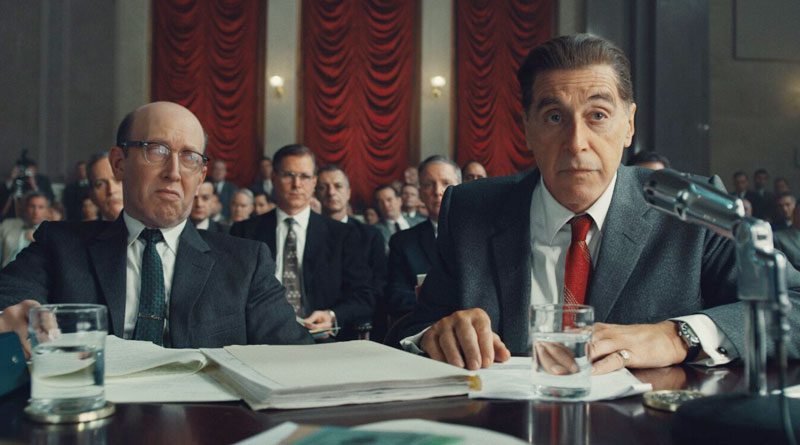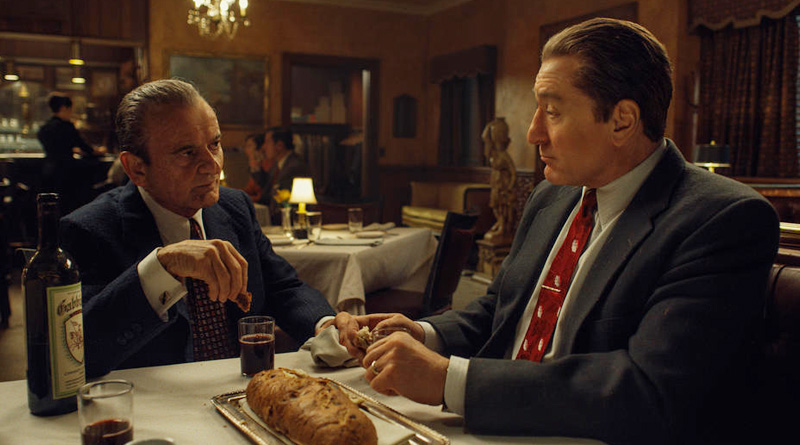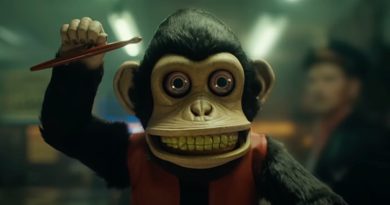The Irishman (2019) Review
The Irishman is a rarity. The kind where Hollywood doesn’t really make any more or willing to risk it big-time, particularly the one requires a huge budget (US$159 million, to be exact) for a genre movie that has nothing to do with established IPs, superhero genres or franchise revivals. Which explained why Paramount, the studio that initially going to finance The Irishman, got cold feet when Martin Scorsese required at least US$100 million to make the film. His reason? Most of the budgetary costs are needed for the extensive de-ageing process to make older actors (Robert De Niro, Al Pacino and Joe Pesci) look younger in several scenes. The project fell apart and went development hell until Netflix finally took the gamble and let Scorsese do whatever he wants. The rest, as they say, is history.
Based on the 2004 nonfiction book I Heard You Paint Houses by Charles Brandt, The Irishman chronicles on the life of Frank Sheeran (Robert De Niro), a former truck driver-turned-mob hitman working for the Bufalino crime family led by Russell Bufalino (Joe Pesci). The story spans over three decades from the 1950s to 1970s, with one of the pivotal moments involving Sheeran being introduced to International Brotherhood of Teamsters union leader Jimmy Hoffa (Al Pacino) as well as Hoffa’s subsequently infamous disappearance in 1975.
As mentioned earlier in the first paragraph, The Irishman is something like a once-in-the-lifetime cinematic experience. I mean, how often we ever get to see Hollywood legends including Robert De Niro, Al Pacino, Joe Pesci and Martin Scorsese working together in such a big-budget prestige picture? The Irishman also marked Scorsese’s longest movie to date, which runs at 209 minutes — the kind of epic length that challenges one’s bladder control if this is viewed in the freezing-cold cinema hall with no intermission (ask anyone who survived watching Avengers: Endgame this year). While those who were lucky enough to watch The Irishman on the big screen in selected cinemas during its limited theatrical run in the US, the rest of the world have to settle on the Netflix platform instead. Which is actually a blessing anyway since watching this in the comfort of your own laptop or television means we don’t have to worry about taking a toilet break (hello, pause button!) in the middle of the movie.
First things first, The Irishman is no Goodfellas or Casino redux. Those who are expecting the same colourful vibes and highly-charged cinematic flourishes previously seen in both movies would likely find The Irishman a disappointment. Scorsese clearly isn’t interested in rehashing either of his modern gangster classics, even though he could have chosen the easy way out and be done with it.

Instead, the movie sees the legendary director challenges himself by making The Irishman less vibrant but more melancholy and poetic. Think of it as Scorsese’s monumental gangster epic equivalent of the late Sergio Leone’s nearly four-hour masterpiece of Once Upon a Time in America (1984), which also ironically starred Robert De Niro in the lead role. It’s more of a gangster movie in the guise of a slow-burn meditative drama about friendships, losses, remorses and growing old. Of course, that doesn’t mean Scorsese has completely alienated his signature filmmaking style. In The Irishman, you still get to see his familiar trademarks ranging from voiceover narration to long takes and sudden burst of violence.
And despite running at three-and-a-half-hour long, the movie only lags in certain parts but that’s forgivable. Kudos goes to Scorsese’s regular editor Thelma Schoonmaker for able to sustain most of the movie’s slow but steady pacing. For a movie at such an epic-length that covers more than a decade’s worth of storytelling is certainly an uphill task for any editor. At the hands of a lesser editor, The Irishman could easily fall prey into something bloated or haphazardly put together but Schoonmaker’s masterful editing proved why she’s still one of the best film editors working today.
Now, what about the much-talked-about de-ageing effects? I would say it was far from perfect. Although there are noticeable improvements in how the effects manage to make the actors’ facial skins look younger, I tend to get distracted over Robert De Niro’s unnaturally glassy blue eyes. I have to admit it does take time for me to get used to seeing them. And yet, as distracting as they may be, De Niro’s quietly affecting performance is more than enough to make me root for his character.
Which brings me one of the most important points of this movie — the actors. All three of them — Robert De Niro, Joe Pesci and Al Pacino — may have hit in their late 70 years of age but Scorsese manages to bring out the best in them, resulting in respectively best late-career performances in years.

Apart from De Niro, it’s nice to see the otherwise long-retired Joe Pesci making a comeback to the Hollywood cinema since 2010’s little-seen drama called Love Ranch. But don’t expect him to pull off another short-fused mob character ala Tommy DeVito in Goodfellas or Nicky Santoro in Casino. Here, this is a different Pesci altogether. Someone who is more understated without all the flashiness commonly associated with Pesci’s acting in a Martin Scorsese movie. Even he’s out of the Hollywood game for so long, he’s hardly losing his acting prowess and in The Irishman, Pesci still has what it takes to deliver another award-worthy performance that might put him in the running for next year’s Oscars for Best Supporting Actor category.
Then, there’s Al Pacino and believe it or not, this is the first time the legendary actor finally get to work with Martin Scorsese. And it’s well worth the wait after so long. Pacino’s showy mannerism is in full display here, playing the real-life figure of Jimmy Hoffa with enough conviction. Never mind the fact that he doesn’t even attempt to look and sound like the real Jimmy Hoffa, unlike Jack Nicholson’s similar role in the otherwise disappointing biopic of 1992’s Hoffa. It’s easy to forgive all that, especially given Pacino’s overall lively performance who also happens to deliver most of the movie’s unexpectedly funny moments.
Too bad Anna Paquin, who plays Sheeran’s grown-up daughter Peggy is largely reduced into a thankless role.
The movie is also worth noting during the sombre final stretch, with Scorsese somehow wanted to tell us as if this would be the last time he made a gangster movie of such an epic proportion. Like a melancholy coda reflecting his past aforementioned genre works that defined his career at the beginning. If this turns out to be true, The Irishman is no doubt an appropriately perfect farewell to Scorsese’s world of the gangster genre.





